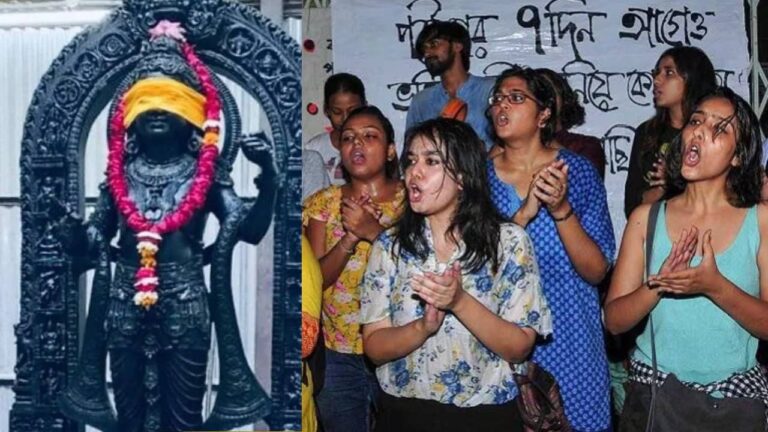News Desk, Kolkata : In a cultural spectacle that transcends borders, the inauguration ceremony of Ram Mandir is set to take place at Jaharlal Nehru University, echoing the spiritual fervor that also resonates at Jadavpur University in West Bengal. The orchestration of the Ram Pujo celebration has expanded its reach to this renowned institution, where a screening is scheduled to unfold in front of the Gandhi Bhavan at noon, courtesy of the initiative by JU students.
However, amidst the anticipation and vibrant posters adorning social media, ambiguity shrouds the organizers’ identity. The poster simply credits the event to ‘JU Students,’ leaving room for speculation and debate. University authorities claim ignorance about the details, while SFI leader Afrin emphasizes the secular mindset prevailing at Jadavpur University. The event is portrayed as an initiative by a student, embodying the essence of cultural diversity rather than religious bias.
Yet, ABVP leader Debangan Pal asserts a different narrative, suggesting that some students are planning a protest during the screening at Ram Mandir, emphasizing that the excitement extends beyond religious lines. The resonance of Ram Mandir’s victory chant is heard across the entire nation, unifying people of diverse backgrounds. The concerns raised by a few young individuals in Jadavpur might not be enough to disrupt the screening.
Adding depth to the story, SFI’s alternative cultural identity promises to shine on that day, providing an alternative perspective. As the controversy brews, the question of religious neutrality is brought to the forefront by Trinamool Chhatra Parishad leader Rajnay Halder. He affirms the progressive nature of Jadavpur University, asserting that religious bias has no place on the campus. He questions the passive stance of left-wing student organizations, urging them to actively uphold the ideals of secular education.
In a firm response, the Jadavpur University Teachers’ Association expresses discontent with the unfolding situation. Parth Pratim Roy, the organization’s general editor, suggests that the incident has already attracted the attention of the authorities. In their application to the administration, they advocate for an environment where such incidents do not disrupt the peaceful and harmonious atmosphere of the campus.
As the controversy deepens, the narrative pivots towards the broader perspective of left-wing student organizations. The disillusionment with their seemingly passive stance prompts introspection. Where are those who once spearheaded protests for various causes? Have they lost their way in the labyrinth of ideology, leaving behind the principles of peace, unity, and harmony?
The juxtaposition of conflicting narratives creates a tapestry of complexities. On one hand, there’s the excitement surrounding the Ram Mandir screening, a celebration of cultural identity. On the other, there’s the voice of dissent, challenging the secular fabric of Jadavpur University. The dichotomy reflects the broader socio-political landscape, where divergent ideologies clash, leaving room for questions and introspection.
In the heart of this narrative lies the essence of a university grappling with its identity. Jadavpur University, known for its progressive ethos, is at a crossroads. The controversy surrounding the screening of Ram Mandir raises crucial questions about the role of left-wing student organizations, their commitment to secularism, and the broader narrative of cultural coexistence on campus.
As the story unfolds, it becomes a reflection of the evolving dynamics within educational institutions. It’s not just about a screening at Ram Mandir; it’s about the clash of ideas, the struggle for identity, and the quest for a harmonious coexistence of diverse perspectives. The controversy becomes a mirror reflecting the challenges faced by universities in maintaining their secular fabric while navigating the currents of socio-political change.
In the end, the Ram Mandir screening at Jadavpur University is not just an isolated event; it’s a microcosm of the larger debates surrounding culture, religion, and identity in contemporary India. The controversy may subside, but the questions it raises will linger, challenging the very foundations of the academic institution and its commitment to fostering an inclusive and tolerant environment for all.
DISCLAIMER
Our news media denounces any form of bias and disapproves of sensationalism. The disseminated news is entirely educational and aimed at social awareness. Our media maintains absolute impartiality, adhering solely to the purpose of education and social consciousness.


